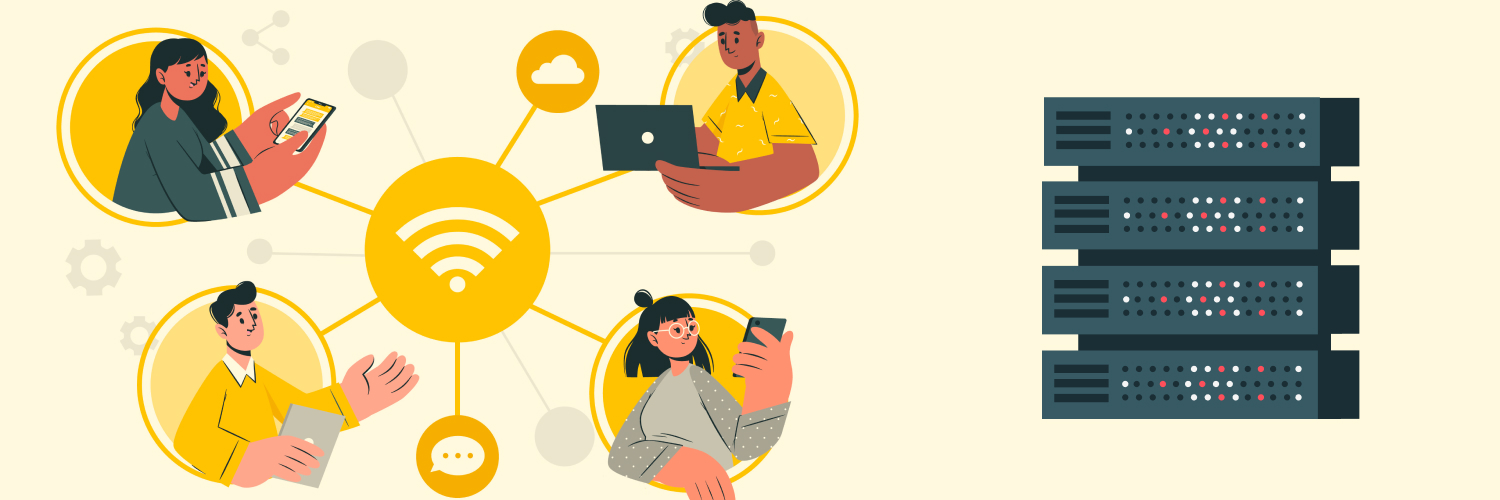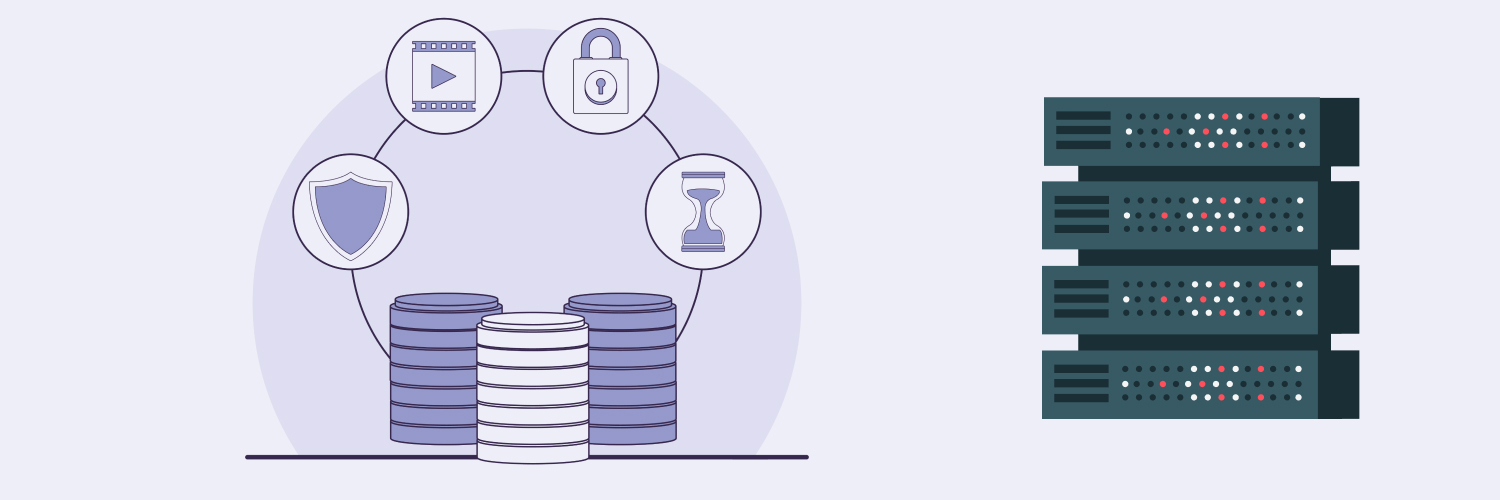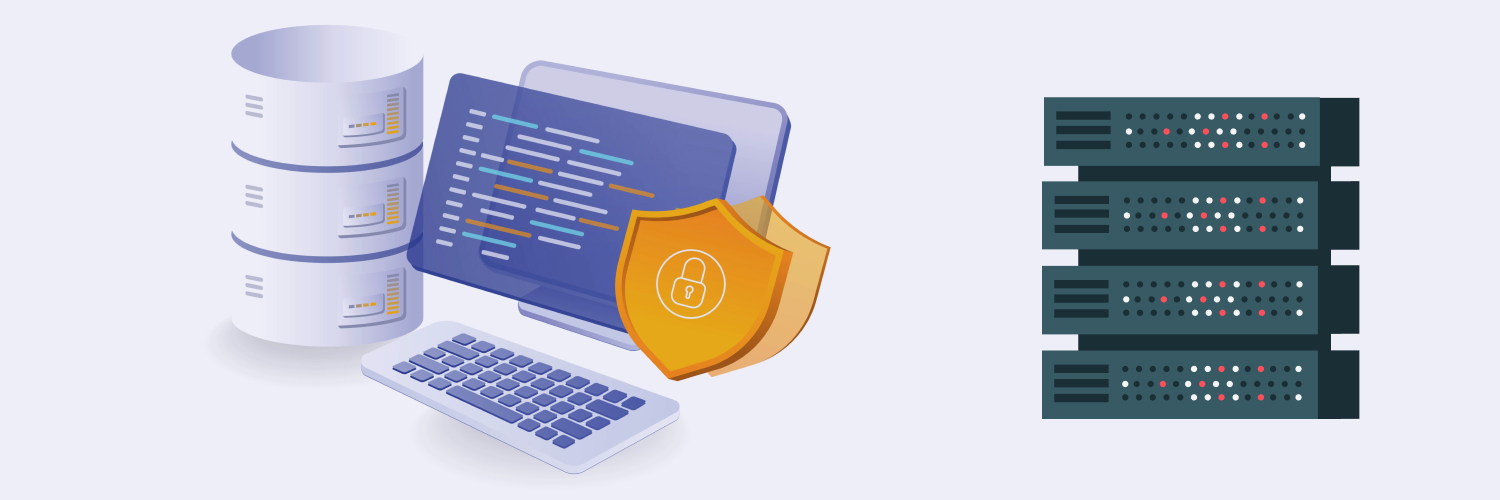The Complete Guide: ISP Proxies vs. Residential Proxies
Do you need help deciding between ISP vs. residential proxies? Are you unsure of which option is best for your specific needs and activities? If you’re confused about the difference between ISP vs. residential proxies, or if you want to know the pros and cons of each option, this guide is for you.
All the distinctions you need to know are explained below. You’ll also find tips on choosing the best proxy provider.
What Are Proxies?

A proxy acts as an intermediary between your device and the websites or online services you want to access. It’s essentially a middleman that directs requests and responses between you and the internet.
Here’s a quick breakdown of how proxies work:
- Request initiation: You send a request to access a website or online resource.
- The request reaches the proxy server: Instead of going directly to the website, your request gets routed to the proxy server first.
- Proxy server acts on your behalf: The proxy server then fetches the requested information from the website using its own IP address.
- Information gets sent back to you: The proxy server receives the information from the website and sends it back to you.
Proxy Benefits
There are many reasons why people rely on proxies for professional and personal use. The following are some of the greatest advantages proxies offer:
Enhanced privacy
When you use a proxy server, your actual IP address gets masked from the websites you visit. This masking allows for an increased sense of anonymity because websites only see the proxy server’s IP address.
Only seeing the proxy server’s IP address makes it harder for websites to track your online activity and identify you personally.
Bypass geo-restrictions
Proxies can also help you bypass geo-restrictions.
Some websites and online services are restricted to specific geographic locations. Proxies can help you overcome these restrictions by making it appear like you’re browsing from a different location.
Improved security
Proxy servers can act as an extra layer of security for your device.
For example, they can filter malicious content, including malware, viruses, etc., before they reach your device. They can also make it difficult for hackers and other malicious actors to target your device directly.
Improved network management and control
Organizations can leverage proxies to manage and control internet access within their networks.
When it comes to content filtering, businesses can use proxies to restrict access to inappropriate or unproductive websites for employees, promoting workplace focus and security.
Organizations can also monitor employee internet activity through proxies, ensuring responsible internet usage and compliance with company policies.
Optimized performance
In some cases, proxy servers can also improve browsing performance.
Proxies can cache frequently accessed web content, reducing the need to download the same information repeatedly. Caching can lead to faster loading times for websites you visit often.
Organizations can use proxies to manage bandwidth usage within their network, too, which can potentially optimize network performance for all users.
What Are Residential Proxies?

Now, let’s get into some of the most common types of proxies, starting with residential ones.
Residential proxies are proxy servers that utilize IP addresses assigned by Internet Service Providers (ISPs) to individual homes and devices. They differ from data center proxies, which use IP addresses associated with data centers rather than individual users.
Residential proxy addresses come from real devices like computers, phones, and tablets connected to the internet through individual ISP subscriptions. They provide a higher level of anonymity and authenticity compared to data center proxies, making them appear like regular user traffic to websites.
Similar to other proxies, residential proxies act as intermediaries between your device and the websites you access. They route your internet traffic through their network, masking your real IP address and location from the websites you visit.
How do residential proxies work?
Residential proxy providers maintain a pool of IP addresses sourced from individual devices connected to the internet through regular home internet service providers (ISPs). When you connect to the internet through a residential proxy, you essentially “borrow” an IP address from one of these devices in the pool.
Similar to other proxies, residential proxies act as intermediaries between your device and the websites you access. Your internet traffic is routed through the chosen device’s IP address, masking your real IP and making it appear as if you’re connecting from that specific location.
Because residential proxies use real devices and IP addresses, they offer more anonymity than data center proxies, which typically have easily identifiable IP ranges. Websites are less likely to suspect you’re using a proxy, as your traffic appears to originate from a regular household connection.
Some residential proxy providers allow you to choose the specific location (country, city, state, and ASN) of the IP address you want to use. This option can help you access geo-restricted content or blend in with local internet traffic for specific tasks.
Many residential proxies also rotate. Rotating residential proxies combine the features of residential proxies with an added layer of anonymity by constantly changing the IP address used. Here’s how they work:
- Dynamic IP assignment: Instead of using sticky sessions and assigning a single IP address for a specific duration, rotating residential proxies constantly change the IP address used for each connection or at predefined intervals. This continuous rotation provides a fresh identity for every request, making it even harder for websites to detect or block your activity.
- Enhanced anonymity and bypassing restrictions: The frequent IP address changes further strengthen the anonymity offered by regular residential proxies. This anonymity can be beneficial for tasks where avoiding detection is crucial, such as web scraping large amounts of data ethically, managing multiple social media accounts, or accessing geo-restricted content from various locations.
- Mitigating bot detection: Websites often utilize anti-bot measures to identify and block automated activity. By constantly changing IP addresses, rotating residential proxies make it appear that different users are making the requests, helping bypass such bot detection mechanisms.
- Proxy pool and rotation methods: Providers typically maintain a vast pool of residential IP addresses. The rotation method can vary, with some changing IPs after every request, at specific time intervals, or based on other factors like encountering website blocks.
What Are ISP Proxies?

ISP proxies, also known as static residential proxies or residential ISP proxies, are a specific type of proxy server that combines characteristics of both data center proxies and residential proxies.
ISP proxies utilize real IP addresses officially assigned by Internet Service Providers (ISPs), similar to residential proxies. This enhances their authenticity and reduces the chances of them being flagged by websites compared to data center proxies, which typically use non-residential IP ranges.
Unlike traditional residential proxies, which might be sourced from individual devices or homes, ISP proxies are often hosted on data center infrastructure operated by the ISPs themselves. This gives them the stability and reliability associated with data center proxies, offering faster speeds and lower latency.
How do ISP proxies work?
When you connect to the internet, your ISP assigns you a unique IP address that identifies your device and location. An ISP proxy masks your real IP by routing your internet traffic through its server, assigning you a different IP address from its pool. This makes it appear as if you’re connecting from the location of the proxy server, offering a degree of anonymity.
When you try to access a website using an ISP proxy, your request first goes to the proxy server. The proxy server then forwards the request to the website on your behalf using its own IP address. The website responds to the proxy server, which sends the response back to you. This way, the website only sees the proxy server’s IP address, not yours.
Some ISP proxy providers offer a pool of IP addresses you can choose from, allowing you to switch between different locations or avoid getting blocked if one IP gets flagged.
Can ISP proxies rotate?
You can also utilize rotating ISP proxies.
Rotating ISP proxies combine datacenter proxies’s speed with residential proxies’ anonymity.
With a rotating ISP proxy, an IP address is hosted from a data center, but it also uses the autonomous system numbers (ASNs) of an Internet Service Provider.
The ASN comes from a trusted network, and every new request gives you a new ISP proxy (that’s where the “rotating” comes into play), which allows you to cycle through an entire pool of proxies.
ISP vs. Residential Proxies: Pros and Cons

Now that you know the fundamental differences between ISP and residential proxies, let’s get into the benefits and drawbacks of each solution. Some of the most important pros and cons are detailed in the following sections.
ISP proxy pros
- High speed/uptime: ISP proxies generally offer superior speed and uptime because they are hosted by data centers and have higher bandwidth.
- Reduced chance of getting blocked: Because they are associated with internet service providers, these proxies typically appear as organic traffic to the websites you’re visiting. As a result, you’re less likely to get blocked by your target website.
- Longer sessions: ISP proxies are known for maintaining long sessions, making them a better choice for tasks that require a stable, long-lasting connection.
- Affordability: ISP proxies are often more affordable compared to residential proxies (although they can still be more expensive than data center proxies).
ISP proxy cons
- Limited subnet diversity: The IPs of ISP proxies are grouped in ranges (also known as subnets). The problem with this approach is that if one IP in the subnet gets blocked, others are likely to be blocked as well.
- Limited location coverage: Depending on the proxy provider, coverage of ISP proxy networks might be limited in certain regions.
- Limited use cases: Compared to residential proxies, ISP proxies have a narrower range of suitable use cases due to their lower level of anonymity and limited location options.
Residential proxy pros
- Very difficult to detect: With residential proxies, the IPs come from real people’s devices, making it difficult for websites to figure out that they are proxies.
- Large IP pools: The IPs of residential proxies often span the globe and offer a wide range of location choices with more precise targeting.
- High diversity: Residential proxies rarely come in a subnet. That means the others will remain functional if one IP address gets blocked.
- Improved success rates for web scraping: By mimicking natural user behavior, residential proxies can bypass anti-scraping measures often employed by websites to block automated data collection.
- Greater trust and credibility: In certain situations, using a local IP address can establish trust and credibility, particularly when interacting with websites or services in specific regions.
Residential proxy cons
- Higher costs: Residential proxies tend to be more costly than ISP proxies, partly due to the complexity of acquiring and maintaining a large pool of actual device IPs.
- Unpredictable speed/stability: Internet speeds and stability vary significantly from person to person. Because of this, if you use a residential proxy, you may also notice performance variability.
- Shared IPs: A residential proxy provider gives all customers access to the same proxy pool. That means that you have to share IPs with other users.
ISP vs. Residential Proxies: Use Cases

As you can see, ISP and residential proxies have benefits and drawbacks. They each have their place depending on your specific goals and reasons for using proxies. Below are some examples of situations where you might use ISP vs. residential proxies.
ISP Proxies
The following are some instances of when ISP proxies might be helpful:
- Bypassing geo-restrictions: ISP proxies help access content restricted in your region. They make it appear that you’re browsing from a different location, allowing you to access geo-blocked websites and services.
- Web scraping: Extracting data from websites is simplified with ISP proxies. They enable sending numerous requests from various IP addresses, bypassing limitations imposed on single IPs and avoiding detection by anti-scraping mechanisms.
- SEO and social media monitoring: These proxies are useful for monitoring search engine rankings and social media mentions across different locations. They provide multiple IP addresses to gather data from various regions, offering a broader perspective.
- Account management: Businesses managing multiple accounts on social media platforms or e-commerce sites can benefit from ISP proxies. These proxies help maintain activity across different accounts while adhering to platform guidelines that restrict multiple accounts from a single IP.
- Enhanced privacy: While not offering complete anonymity, ISP proxies provide a layer of privacy by masking your real IP address. This can benefit users seeking to browse the internet with some degree of anonymity.
Residential Proxies
Conversely, in the following scenarios, you might be better off using residential proxies:
- Web scraping with anonymity: Residential proxies excel at web scraping, where bots automatically extract data from websites. Their origin from real devices makes them appear like regular users, bypassing anti-scraping measures designed to detect and block automated activity from data center proxies.
- Enhanced SEO monitoring: SEO professionals leverage residential proxies to track search engine rankings and gather data from various locations. This provides a more accurate picture of global search results, aiding in optimizing websites for better visibility across different regions.
- Ad verification: Verifying ad placement and visibility is crucial for advertisers. Residential proxies enable them to check how their ads appear across diverse geographic locations, ensuring proper delivery and effectiveness of advertising campaigns.
- Social media management and automation: Managing multiple social media accounts or automating tasks like content scheduling and interactions often requires switching between IP addresses. Residential proxies provide a pool of real-looking IPs, allowing seamless management without raising suspicion from social media platforms that might block activity originating from a single IP.
- Price comparison and market research: Comparing prices across different websites or conducting market research in specific regions can be effectively achieved with residential proxies. They enable users to access local versions of websites and gather data while simulating a local presence, providing valuable insights into regional pricing and market trends.
- Accessing Geo-restricted content: Similar to ISP proxies, residential proxies can bypass geo-restrictions on websites and streaming services. However, their origin from real devices in various locations often makes them more reliable for accessing regionally blocked content.
How to Choose an ISP Proxy Provider

If you think ISP proxies are the right fit for you and your needs, you have plenty of providers to choose from. They’re not all created equal, though.
Here are some of the most important factors to consider when selecting an ISP proxy provider:
Speed
Remember that an ISP proxy is based in a data center, giving you the best of both worlds. You get residential-level authority and ban prevention, plus data center speeds and availability.
That’s why we recommend looking for an ISP proxy provider that offers at least 1 Gbps speed.
Protocol types
Your ISP proxy provider should give you the option to switch between the most common protocol types, such as HTTP, HTTPS, and SOCKS.
Location
Ideally, you’ll choose an ISP proxy provider that offers ISP IPs from a variety of countries. That will give you more options and allow you to get the most out of your proxies.
How to Choose a Residential Proxy Provider

On the other hand, if you want to use residential proxies, be sure to consider the elements listed below. They will help you ensure you’re picking a reliable residential proxy provider:
Pool size
The best residential proxy providers will offer access to a large pool of proxies. A larger pool gives you more variety to work with and allows you to navigate projects of numerous sizes.
Location targeting
Look for a proxy provider that allows you to target multiple countries, states, cities and ASNs. You should be able to do this at no additional cost as well.
CAPTCHA-avoidance
Residential proxies — specifically rotating residential proxies — are less likely to trigger CAPTCHAs. Make sure the provider you’re thinking about working with offers solutions that help you avoid dealing with CAPTCHAs and other anti-scraping technologies.
Bonus: More Things to Consider When Choosing Proxies
Whether you’re leaning toward ISP or residential proxies, these additional tips can help you further refine your search. They apply to both types of proxies:
Thread limits
There should not be any limits on the number of concurrent connections you can send. Furthermore, every request should receive a unique IP address.
Sourcing
Only work with residential proxy providers that practice ethical sourcing.
Ethical sourcing involves transparency regarding the ways in which the provider acquires IP addresses. For example, do they pay people for the use of their IP address? Do they purchase from trusted resellers?
Find out how the provider sources their proxies before making a final decision — and if you can’t find a clear answer, there’s a good chance they’re using dubious methods.
Pricing
Transparent pricing is also critical when selecting a proxy provider. Look for a provider that offers a clear breakdown of their pricing structure and makes it clear what you’ll be paying and what you’ll get.
Free trials
Many proxy providers also offer free trials and give you a chance to experiment before investing in a paid plan. If you’re new to proxies, free trials can be especially helpful as they give you a low-stakes opportunity to figure out how different tools work.
Customer support
Finally, look for a provider that offers extensive customer support. Ideally, they’ll have 24-7 support available and multiple methods you can use to contact them (chat, email, etc.).
Final Thoughts

Are you feeling more confident in your ability to distinguish between ISP proxies vs. residential proxies? Keep the information shared in this guide in mind so you can pick the best proxy type for your personal or professional needs.
Are you looking for a proxy provider (for residential or ISP proxies) that checks all the boxes shared above? If so, partner with Rayobyte.
Rayobyte values ethics and reliability in all that we do. We are the United States’ largest proxy provider and offer residential and ISP proxies, as well as data center proxies, mobile proxies, rotating ISP proxies, and more.
Sign up for a free trial today.
The information contained within this article, including information posted by official staff, guest-submitted material, message board postings, or other third-party material is presented solely for the purposes of education and furtherance of the knowledge of the reader. All trademarks used in this publication are hereby acknowledged as the property of their respective owners.






